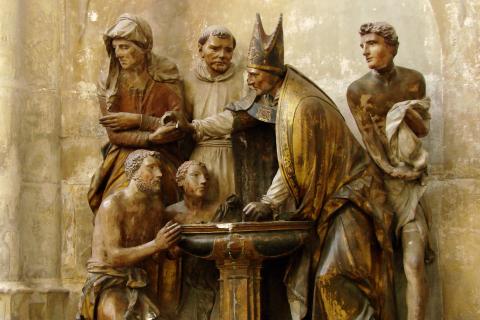Last week, a POLITICO journalist struck a nerve when she indicated in an MSNBC interview that those who believe that “our rights as Americans” come from God rather than “any earthy authority,” like Congress or the Supreme Court, are Christian nationalists.
She walked back her comments in a separate piece noting the complexities of the issue. But the loaded use of the term “Christian nationalism” still seems primed for levying against those who may just be Christians trying to think truly about just governance. Where does the distinction lie?
It's helpful to consider the origins of the term “nationalism,” at all. It gained prominence largely in the 18th and 19th centuries, when Christianity was losing its grip as the glue of society. Nationalism became a pseudo-religion – a new, replacement glue – making participation in a particular human grouping the fundamental source of meaning, identity, and loyalty. Then and now, whenever and wherever it’s found, it always gives such participation a spiritual significance it doesn’t have, and so it’s always misleading, and always bad, even if it isn’t always harmful.
Ross Douthat published his take on “four ways of looking at” specifically “Christian” nationalism in a New York Times opinion piece following the MSNBC debacle. He noted that the term, if defined in a precise way and along this historical line, could be taken as “The belief that America is a chosen nation commissioned by God to bring about some form of radical transformation in the world.” This is indeed the nationalistic American Myth, a pseudo-religious way of viewing our country in the way we’re meant to view the Church. Of course, the USA is not the hope of the world; Christ and His Church are, and Christians can distinguish themselves from a position that suggests otherwise readily.
The difficulty is that these terms don’t always stay quite so clear. As Douthat notes, Christian nationalism is more often used in contemporary discourse to refer to “any kind of Christian politics” found “disagreeable or distasteful.” This is problematic – in part, he notes, because all of American history would look very different without that kind of politics: he tracks the influence of a kind of Christian politics in the founding era, across the 19th century’s revivals, throughout the Civil War, across the industrial era, and perhaps most notably in the religious rhetoric of Martin Luther King, Jr. “Today’s religious conservatives,” he said, “are mostly just normal American Christians doing normal American Christian politics, not foot soldiers of incipient theocracy.”
Faithful Christians’ creed won’t move them to become nationalists; but it will encourage them to embrace their duty toward the society and land that has given sustenance and nurture, and with a spirit of gratitude and patriotism that is both natural and right. This perhaps courts a level of political involvement – of “normal American Christian politics” – that those opposed to Christianity may find uncomfortable: with some palpable hedging, the POLITICO correspondent, for example, suggested that Christians need to “properly” bring their religious faith into the political arena. And while the terrain of questions around religion and politics that she’s stepped into is surely massively complex, her hedging is not, perhaps, totally fair to what Christian politics makes for. Christians trying to think truly about just governance do not advocate theocracy or a confessional state. Rather, a Christian politics celebrates both endowed-by-our-Creator equal rights, and also the fixing of human hopes and energy on something far beyond a pure, perfected America.
Today marks the 750th anniversary of the death of Saint Thomas Aquinas. To mark the even of the anniversary, the saint's skull was processed through the Italian village of Priverno, which is located near the abbey in which he died in 1274. For those looking to encounter Aquinas, a philosophy professor reflects on how he fell in love with the saint's thought (after a couple of failed attempts).
The year 2024 also marks the 800th anniversary of the arrival of the Franciscans in England, after a group of friars sent personally by Saint Francis of Assisi arrived in Canterbury.
We're addicted to distraction. One author offers a clear argument for why this matters and offers a seemingly-simple practice to break free.
As we consider the web of distractions in our lives, another author asks: "What is man that AI should keep him in mind?"


